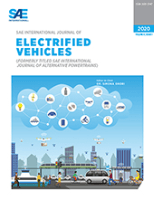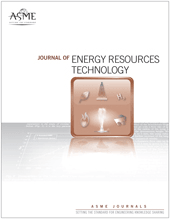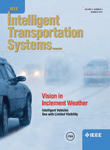
SAE International Journal of Electrified Vehicles
Scope & Guideline
Pioneering Research for Sustainable Vehicle Solutions
Introduction
Aims and Scopes
- Hybrid and Electric Vehicle Technologies:
The journal covers the development and optimization of hybrid and electric vehicle technologies, including battery management systems, powertrain control strategies, and energy storage solutions. - Modeling and Simulation:
A significant emphasis is placed on modeling and simulation techniques to predict vehicle performance, energy consumption, and thermal management, which are crucial for the design and operation of electrified vehicles. - Control Strategies and Algorithms:
Research often focuses on advanced control strategies, including machine learning and reinforcement learning, to improve the efficiency and responsiveness of electric vehicle systems. - Energy Management Systems:
The journal addresses various energy management strategies that optimize the use of energy in hybrid and electric vehicles, enhancing performance while reducing emissions. - Sustainability and Environmental Impact:
There is a consistent focus on the sustainability of electrified vehicles, including studies on emissions reduction, energy efficiency, and the integration of renewable energy sources.
Trending and Emerging
- Connected and Automated Vehicle Technologies:
There is a notable increase in research related to connected and automated vehicles, emphasizing the integration of advanced communication systems and automation in enhancing vehicle performance and user experience. - Energy Management Optimization:
Emerging themes include advanced energy management strategies that utilize AI and machine learning algorithms to optimize energy consumption and improve the efficiency of hybrid and electric vehicles. - Renewable Energy Integration:
Research focusing on the integration of renewable energy sources, such as solar and wind, into vehicle systems is gaining importance, particularly in vehicle-to-grid applications. - Thermal Management Innovations:
The development of innovative thermal management systems to enhance battery and motor performance is becoming increasingly relevant, driven by the need for improved efficiency and longevity of electrified vehicles. - Digital Twin and Predictive Analytics:
The use of digital twin technology and predictive analytics for real-time monitoring and optimization of vehicle systems is emerging as a significant trend, enabling better performance predictions and maintenance strategies.
Declining or Waning
- Traditional Internal Combustion Engine Studies:
Research centered on traditional internal combustion engine technologies has seen a decrease, likely due to the growing emphasis on electrification and hybridization in the automotive sector. - Basic Battery Chemistry Studies:
While battery technology remains critical, basic studies focusing solely on battery chemistry without application in hybrid or electric contexts are becoming less common in favor of more applied research. - Low-Level Control Techniques:
There is a waning interest in basic low-level control techniques for electric vehicles as more sophisticated and integrated approaches, such as AI and machine learning, gain traction.
Similar Journals

JOURNAL OF ENERGY RESOURCES TECHNOLOGY-TRANSACTIONS OF THE ASME
Pioneering insights into renewable energy and sustainability.JOURNAL OF ENERGY RESOURCES TECHNOLOGY-TRANSACTIONS OF THE ASME is a prestigious journal dedicated to advancing the knowledge and application of energy resources technology across various disciplines. Published by the American Society of Mechanical Engineers (ASME), this journal plays a critical role in fostering innovative research within energy engineering, fuel technology, geochemistry, and mechanical engineering, evidenced by its solid impact factor and commendable Scopus rankings, including a Q1 ranking in Mechanical Engineering. The journal's comprehensive scope covers a wide array of subjects, from renewable energy solutions to sustainability practices, making it an essential platform for researchers, professionals, and students eager to contribute to and stay abreast of developments in the energy sector. With an impressive convergence history dating back to 1979, it continues to uphold rigorous academic standards and provides valuable insights into the latest technological advancements and methodologies relevant to the field. While the journal does not offer open access options, it is unequivocally a vital resource for those engaged in cutting-edge energy research.

INTERNATIONAL JOURNAL OF AUTOMOTIVE TECHNOLOGY
Advancing the Future of Mobility Through ResearchINTERNATIONAL JOURNAL OF AUTOMOTIVE TECHNOLOGY, published by the Korean Society of Automotive Engineers (KSAE), stands as a key platform in the field of Automotive Engineering since its inception in 2000. With an ISSN of 1229-9138 and an E-ISSN of 1976-3832, this esteemed journal aims to disseminate cutting-edge research, innovative methodologies, and advancements in automotive technology. As of 2023, it holds a distinguished Q2 quartile ranking in the Automotive Engineering category on Scopus, featuring a competitive rank of 48/125, illustrating its recognition among peers and the academic community. The journal also enjoys a global readership despite its base in South Korea. Researchers, professionals, and students in the automotive sector are encouraged to contribute to this journal, thus promoting collaboration and knowledge exchange that fosters innovation and progress in automotive engineering. Additionally, the journal is committed to enhancing accessibility of knowledge across boundaries and aims to continue serving as a catalyst for academic growth up to the year 2024.

Vehicles is a pioneering open access journal published by MDPI since 2019, dedicated to advancing knowledge in the fields of Automotive Engineering and Electrical and Electronic Engineering. Based in Switzerland, the journal provides a valuable platform for researchers, professionals, and students to disseminate high-quality, peer-reviewed research across essential areas of vehicle technology and innovation. With an impressive Q2 ranking in both Automotive Engineering and Electrical and Electronic Engineering as of 2023, and a notable placement in the Scopus rankings (Rank #37/125 and #320/797, respectively), Vehicles plays a critical role in fostering collaboration and knowledge exchange within these fast-evolving disciplines. Through its commitment to Open Access, Vehicles ensures that cutting-edge research is accessible to a global audience, thereby contributing significantly to the collective understanding and development of sustainable transportation solutions. Situated at the crossroads of engineering innovation and practical application, Vehicles invites contributions that explore contemporary challenges and promote transformative advancements in the automotive sector.

International Journal of Heavy Vehicle Systems
Transforming Heavy Vehicle Systems Through ResearchThe International Journal of Heavy Vehicle Systems, published by INDERSCIENCE ENTERPRISES LTD in the United Kingdom, is a pivotal resource for professionals and researchers in the fields of automotive and mechanical engineering. With an ISSN of 1744-232X and an E-ISSN of 1741-5152, this journal serves as an academic platform dedicated to exploring the latest innovations and technologies pertaining to heavy vehicle systems, including design, performance, and environmental impact. Boasting a Category Quartile of Q3 in both Automotive and Mechanical Engineering as of 2023, it ranks among the growing body of literature in these disciplines, indicative of its commitment to quality research. The journal is widely accessible through diverse open access options, encouraging the dissemination of knowledge within the academic community. By publishing cutting-edge studies and reviews, the International Journal of Heavy Vehicle Systems plays an essential role in advancing our understanding of heavy vehicle technologies, providing invaluable insight for engineers, researchers, and students eager to contribute to this dynamic field.

IEEE Intelligent Transportation Systems Magazine
Transforming Transportation Through InnovationIEEE Intelligent Transportation Systems Magazine, published by the IEEE-Institute of Electrical and Electronics Engineers Inc., is a leading journal in the fields of automotive engineering, computer science applications, and mechanical engineering. With an impressive impact factor reflected in its 2023 rankings, this journal sits in the top quartile (Q1) across multiple engineering categories, making it an essential resource for researchers and professionals dedicated to advancing the intelligent transportation systems landscape. The magazine covers a diverse array of topics from vehicle technology innovations to traffic management solutions, aimed at improving transportation efficiency, safety, and sustainability. Since its inception in 2009, the publication has established a solid reputation for disseminating cutting-edge research and practical applications in intelligent transportation, all while remaining an accessible resource for academic and industrial stakeholders alike. Subscribe today to stay at the forefront of transformative transportation technologies!

Power Electronics and Drives
Bridging Theory and Practice in Power SystemsPower Electronics and Drives is a leading journal dedicated to advancing the field of power electronics, encompassing a wide range of topics including converter designs, motor drives, and renewable energy applications. Published by SCIENDO, this journal has been proudly open access since 2016, making cutting-edge research accessible to scholars and practitioners around the globe. With a commitment to high-quality publication, Power Electronics and Drives serves as a crucial platform for researchers, professionals, and students to share their findings, fostering collaboration and innovation within the community. The journal aims to bridge the gap between theory and practical applications, thus playing an essential role in shaping the future of power electronic systems and their integration into various technologies. Located in Warsaw, Poland, this journal is poised to contribute significantly to the field and enhance knowledge dissemination across international boundaries.

SAE International Journal of Vehicle Dynamics Stability and NVH
Elevating Standards in Automotive Engineering ExcellenceSAE International Journal of Vehicle Dynamics Stability and NVH is a prestigious publication dedicated to advancing knowledge in the domains of automotive engineering, computational mechanics, control and optimization, and mechanical engineering. Published by SAE International, this journal boasts an impressive impact factor within its category, achieving a Q1 ranking in 2023 across multiple fields, including automotive engineering and computational mechanics. With ISSN 2380-2162 and E-ISSN 2380-2170, it serves as a crucial platform for the dissemination of innovative research and technological advancements in vehicle dynamics and noise, vibration, and harshness (NVH) analysis. Researchers, professionals, and students benefit from the journal's rigorous peer-review process and its commitment to high-quality publications. With a wide-reaching influence and an emphasis on interdisciplinary approaches, the journal is pivotal for those seeking to contribute to the evolution of vehicle technology and related areas.

eTransportation
Driving Innovation in Transportation ResearcheTransportation is a premier academic journal published by Elsevier, dedicated to advancing the fields of Automotive Engineering, Electrical and Electronic Engineering, Energy Engineering and Power Technology, and Transportation. Since its inception in 2019, the journal has achieved an outstanding reputation, maintaining a prestigious Q1 ranking across multiple categories in the 2023 Scopus rankings, including a remarkable top position in Automotive Engineering. With an impact factor reflecting its influence and rigorous peer-review process, eTransportation serves as a vital platform for researchers, professionals, and students alike, fostering innovation and disseminating vital research findings that shape the future of transportation technologies. Based in the Netherlands, it supports open access options that enhance the visibility and accessibility of research, ensuring scholarly engagement worldwide. As the field evolves, eTransportation is poised to lead discussions and advancements towards more efficient, sustainable, and intelligent transport solutions.

EURO Journal on Transportation and Logistics
Exploring innovative solutions for a connected world.The EURO Journal on Transportation and Logistics, published by ELSEVIER, is a premier open access journal dedicated to advancing the fields of transportation and logistics. Since its establishment in 2013, the journal has become a vital platform for disseminating cutting-edge research and insights, reflecting its significant impact in the academic community, as evidenced by its Q1 ranking in both Management Science and Operations Research and Modeling and Simulation as of 2023. Hailing from the Netherlands, this journal caters to a diverse array of scholarly disciplines, as highlighted by its ranking within the top quartiles across various Scopus categories including Mathematics, Decision Sciences, and Social Sciences. With a commitment to transparency and accessibility through its open access policy since 2020, the journal strives to engage not only researchers but also professionals and students, fostering a collaborative environment for the exploration of innovative solutions within the transportation and logistics sectors.

International Journal of Intelligent Transportation Systems Research
Optimizing Transportation Networks for a Smarter TomorrowInternational Journal of Intelligent Transportation Systems Research, published by Springer, stands as a premier platform for disseminating cutting-edge research in intelligent transportation systems (ITS). Established in 2010, this journal has made significant strides in addressing the complexities and innovations within the realm of transportation engineering, automotive technology, control systems, and information systems, reflected in its impressive categorization across diverse engineering and applied mathematics disciplines with notable rankings in Q2 and Q3 quartiles. With a steadfast commitment to advancing knowledge and fostering discussions that bridge academia and industry, the journal welcomes high-quality research articles, reviews, and case studies that explore emerging trends, technologies, and methodologies shaping the transport sector. Researchers, professionals, and students alike will find a wealth of insights aimed at optimizing operational efficiencies and enhancing safety and sustainability in transportation networks. As of 2023, the journal continues to thrive, seeking to compile contributions that align with its mission of improving transportation systems globally.